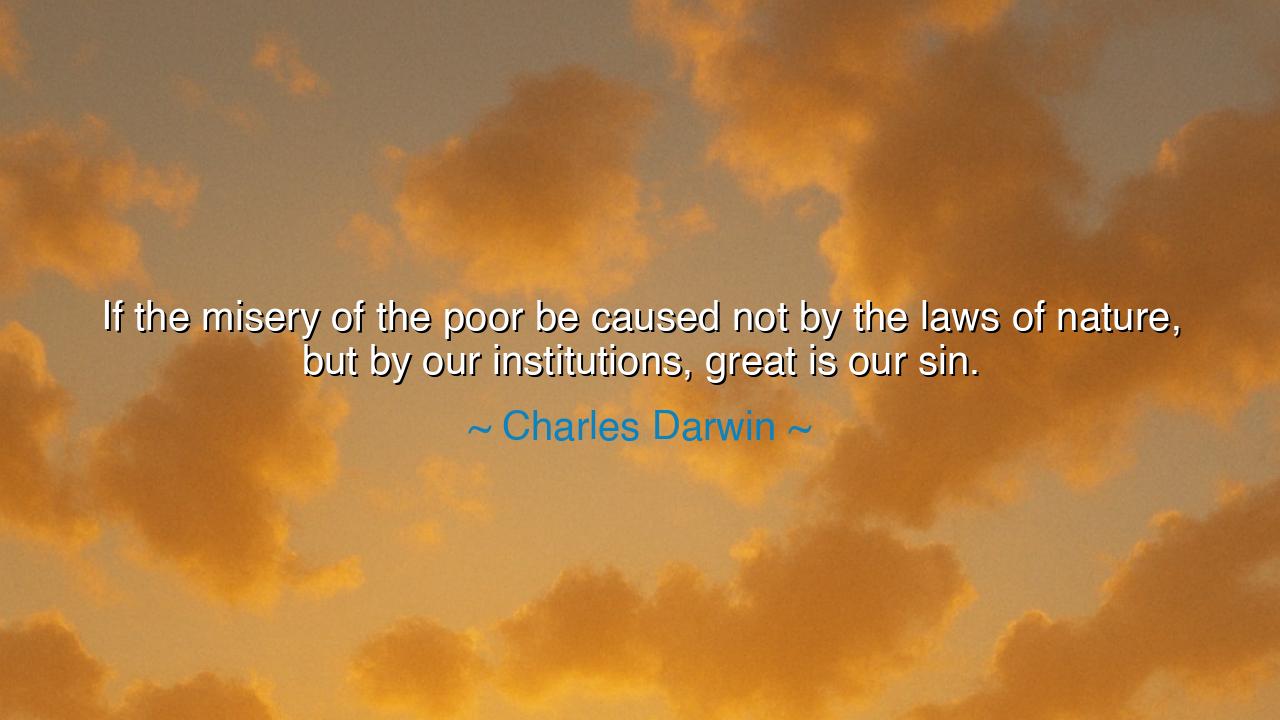
If the misery of the poor be caused not by the laws of nature
If the misery of the poor be caused not by the laws of nature, but by our institutions, great is our sin.






Hearken, O seekers of wisdom, and attend to the words of Charles Darwin, a mind keenly observant of both nature and society, who declared: “If the misery of the poor be caused not by the laws of nature, but by our institutions, great is our sin.” At first glance, these words may appear as a reflection on social inequality, yet beneath them lies a profound meditation on justice, moral responsibility, and the duty of humanity to shape institutions in accordance with virtue. The ancients understood that while nature is impartial, human creations—laws, governments, and social structures—carry the weight of ethical obligation.
Darwin begins with the principle of distinguishing natural hardship from human-inflicted suffering. Misery caused by famine, disease, or the unpredictable turns of fortune is the law of nature, impartial and inevitable. Yet suffering perpetuated by unjust laws, oppressive policies, or corrupt institutions is a burden created by human hands, and thus a moral failing. The philosophers of Athens and Rome taught similarly: justice and equity are responsibilities of society, and neglect or abuse of these duties constitutes not merely error, but transgression against the common good.
The essence of this wisdom lies in the ethical duty to examine and reform institutions. Darwin reminds us that human suffering is not only to be observed, but to be understood in its origin. If the chains that bind the poor are forged by our own structures, then it is the responsibility of the virtuous to unbind them. Consider the reforms of Solon in ancient Athens, who alleviated debt slavery and restructured laws to protect the vulnerable. His courage illustrates that the moral measure of a society lies in its treatment of the least among it.
Darwin’s reflection also illuminates the power and responsibility of collective action. Poverty and misery are not solely the plight of the individual, but the product of systems that can be studied, critiqued, and transformed. History provides countless examples: in 19th century England, the Industrial Revolution brought both wealth and suffering, and reformers such as Lord Shaftesbury worked tirelessly to change child labor laws, reducing misery caused not by nature but by human institution. The lesson is that ethical oversight and intervention can alleviate the burdens imposed by human constructs.
The quote further underscores the gravity of institutional injustice. To allow suffering to persist when it is preventable is not a neutral act, but a moral failing of great magnitude. Consider the abolitionists who fought to end slavery: their recognition that human-made misery was a sin against humanity drove them to action, at great personal risk. Darwin’s words echo this principle, asserting that knowledge of institutional wrongdoing imposes moral obligation.
From this reflection emerges a practical teaching: examine the systems and laws that govern society. Identify structures that perpetuate suffering, inequity, or oppression, and commit to reforming them through reasoned action, advocacy, or personal example. It is not enough to lament injustice; one must understand its source and strive for remedies aligned with fairness and compassion.
Practically, this calls for awareness, education, and active engagement: study social conditions, support just policies, and aid those affected by structural inequities. Recognize that institutions, unlike nature, can be shaped by human hands, and therefore carry moral weight. By acting to alleviate avoidable suffering, one fulfills a profound duty to justice and humanity.
Thus, let it be known: misery caused by human institutions is a sin that demands courage, reflection, and reform. Walk through life with vigilance and compassion, striving to identify and correct the structures that perpetuate inequality. In this way, society is elevated, injustice is confronted, and the human spirit aligns with the moral imperative to protect, nurture, and honor the dignity of all.






AAdministratorAdministrator
Welcome, honored guests. Please leave a comment, we will respond soon